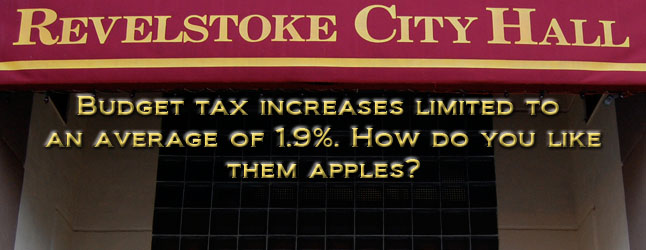By David F. Rooney
City Council has endorsed a version of the 2014-2018 Financial Plan that calls for 2% increase for residential property taxes and a 1% increase for business taxes.
This was one of two versions of the plan that Council considered. The other version set residential taxes at 2% and business taxes at 0%. Council had demanded the two versions after it rejected an original budget proposal that called for tax increases of 3.9%
Councillors Chris Johnston, Gary Starling and Phil Welock voted in favour of adopting the revised plan calling for the 2-and-1 increase while Tony Scarcella and Linda Nixon voted against it. Councillor Steve Bender was out of town for a medical appointment.
This means City staff will now prepare a bylaw allowing Council to formally adopt the 2014-2018 Financial Plan.
Here is the breakdown for 2014 tax increases:
Class 1 (Residential) — 2%
Class 2 (Utility) — 7.96%
Class 4 (Major Industry) — 4.25%
Class 5 (Light Industry) — 2%
Class 6 (Business) — 1%
Class 8 (Seasonal) — 2%
Average — 1.99%
Compared to 2013 the new plan reduces taxation revenues for 2014 by approximately $30,000 but continues to demonstrate financial success in many areas including no new borrowing commitments in 2014, a sequential reduction of debt, and the transition to building up reserves as well as a gradual shift of a reduction in business taxation.
The budget foresees revenues of $22.73 million in 2014 and expenses of $21.07 million, roughly the same as last year. The budget predicts a surplus of $1.6 million. All of this comes as a results of some cuts to planned capital projects, outlined in Appendix 3 at the back of the Financial Plan document.
“The City is committed to continuing to find new ways of operating with fewer resources while maintaining service levels keeping in mind that the community survey clearly indicated that overall citizens want the City to retain our current high service levels,” Chief Administrative Officer Tim Palmer said.
He said that based on community feedback, council uncertainty and some ambiguity in the project mandate the bulk of the City Hall improvements have been removed from the 2014 budget year. The necessary changes to development services will still be completed; however the exterior replacement and elevator installation will not be done this year.
The plan eliminates planned borrowing for some capital projects such renovating the exterior of City Hall — that will be paid through revenues —and puts off a number of other capital projects until 2015 or even later. Councillors regarded this financial plan as an improvement over previous ones but all had at least one or two reservations.
Chris Johnston was happy to see a number of “systemic changes that seem to be happening” but wished that the City had a better way of dealing with capital projects instead of just putting them off.
“Things are starting to turn around,” said Gary Starling, adding that he thinks City officials have a better handle on issues and problems than in years past and he is pleased that there “is less borrowing.”
The one potential issue he is concerned about is that “revenue projections always seem to a little inflated” and, in the end, seem to be lower than predicted.
Still Starling, who is chairman of Council’s Public Works Committee, was generally pleased with the budget even though several capital projects were put off.
“We had a pretty big wish list but they’re getting whacked,” he said.
Phil Welock made the observation that, no matter what some members of the public think, the City is not broke.
“We’re not broke,” he said. “We have $104 million in assets. That’s an over-reaction by the public.”
Still, the City could do more, he said.
“I think we could look at some staff reductions,” he said. “We’re bloated and I think the public perception is we’re bloated.”
As for Scarcella and Nixon, they had different reasons for voting against this version of the plan.
Nixon said she thought the bottom line could be improved in 2018 and Scarcella said he wanted to see deeper cuts in spending noting that spending has increased from $16 million in 2010 to $19 million in 2012 and $21 million in 2013 and again this year.
Mayor David Raven wrapped up discussion by noting that this Council “inherited a city with infrastructure that is 100 years old.”
For years past previous Councils put off improving the City’s infrastructure to the point that much of it really needs to be improved or replaced. That’s a major challenge.
However, on the upside he noted that 130 people turned up at the Town Hall Meeting “to tell us what they think.”
“It wasn’t pleasant, but still, 130 people came out to talk to us and that hadn’t happened before.”
Please click here to read the proposed 2014-2018 Financial Plan.




